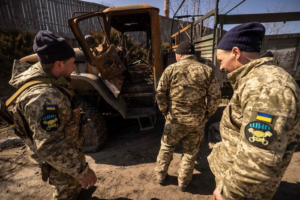

Scientists are racing to catch up with the policy response to the Omicron variant, as virologists study its many mutations and drugmakers test it against their Covid-19 vaccines and treatments.
Officials in South Africa and around the world have moved quickly to warn of Omicron’s potentially heightened infectiousness and to isolate travelers who may be infected with the variant. The rapid response stands in contrast to the handling of earlier variants including Delta, which drove a devastating wave in India months before the World Health Organization classified it a “variant of concern” and officials in the U.S. revisited guidelines on masking and other measures to contain its spread.
Some officials said travel restrictions are meant to buy time to study and prepare for the variant. Some public-health experts said outright travel bans often come too late, include loopholes that the virus can exploit, or penalize countries for sharing information.
“Blanket travel bans will not prevent the international spread, and they place a burden on lives and livelihoods,” the WHO said Tuesday.
Scientific understanding of the variant remains a work in progress. The first known case of Omicron came from a Covid-19 test sample taken in South Africa on Nov. 9. The variant’s more than 50 mutations first grabbed the attention of researchers last Tuesday. That is too short a time for the virus to reach large numbers of people or inflict the most serious damage on those it does infect, health experts said.
“There won’t be one Eureka moment,” said Richard Lessells, an infectious-disease specialist at the KwaZulu-Natal Research Innovation and Sequencing Platform in South Africa. “It will be a gradual process of understanding.”

Travelers from South Africa were tested upon arrival in the Netherlands on Tuesday.
Photo:
remko de waal/Shutterstock
South Africa on Tuesday recorded 4,373 new Covid-19 infections, up from 245 on Nov. 9, the date to which researchers have traced the first known Omicron case. Salim Abdool Karim, director of the Centre for the AIDS Programme of Research in South Africa and one of the country’s leading epidemiologists, said on Monday he expected cases to reach 10,000 a day by the end of the week.
More than 3,140 of the cases recorded Tuesday came from Gauteng, the province that includes the political and economic capitals of Pretoria and Johannesburg, where experts estimate Omicron is driving around 90% of new infections. Several other provinces also reported rising cases.
The number of people hospitalized with Covid-19 in Gauteng has also increased sharply over the past two weeks, although admissions so far are in line with previous Covid-19 waves driven by other variants, including Delta. Doctors say it is too early to tell whether current Covid-19 patients will get less or more severely ill, since it usually takes a week or two after infection for serious symptoms to develop.
One early sign from South Africa that has worried scientists is an unusually large number of reinfections among people infected during the Delta wave earlier this year. Ron Whelan, chief commercial officer at South Africa-based insurer Discovery Health, said it was too early to tell whether there has been an uptick in reinfections among the health insurer’s 3.5 million members. Discovery Health estimates that some 70% of South Africa’s 60 million residents have had Covid-19. Some 24% of South Africans are fully vaccinated.
Anthony Fauci,
the Biden administration’s top medical adviser, said U.S. officials were discussing Omicron’s characteristics with experts in South Africa. “With the small number of cases, it is very difficult to know whether or not this particular variant is going to result in severe disease,” Dr. Fauci said.

Residents waited to be vaccinated Tuesday in Cape Town, South Africa.
Photo:
Dwayne Senior/Bloomberg News
Pharmaceutical companies are studying whether their vaccines and treatments perform as well against Omicron as earlier strains.
Moderna Inc.
and partners
Pfizer Inc.
and
have said that they are testing whether their Covid-19 shots protect against the new variant and that they can have Omicron-targeted vaccines ready in months if necessary.
Some of Omicron’s mutations have made other variants either more transmissible or allowed them to evade parts of the immune response triggered by vaccination or previous infection. More research is needed to understand how these mutations and others might affect Omicron’s infectiousness or potential for immune escape.
Even if Omicron ends up being able to evade the immune response from vaccines or prior infection to some degree, Dr. Fauci said boosting immunity with the current vaccines will still likely remain beneficial, particularly against severe disease. The Centers for Disease Control and Prevention strengthened its guidance on Monday to recommend that everyone 18 and older get a booster shot.
Regeneron Pharmaceuticals Inc.
said preliminary tests showed its Covid-19 antibody drug cocktail loses effectiveness against Omicron, a sign that some products in an important class of therapies might need modifying if the new strain becomes widespread. Separate testing of another authorized Covid-19 antibody drug cocktail, from
& Co., indicates it also isn’t as effective against Omicron, outside scientists said. Lilly said it is running tests and wouldn’t speculate on the results.

A British Transport Police officer checked that passengers were wearing face coverings Tuesday in London.
Photo:
adrian dennis/Agence France-Presse/Getty Images
Antiviral drugs under review by U.S. regulators, including pills from Pfizer and another from
& Co. and partner Ridgeback Biotherapeutics LP, appear likely to be unaffected by the variant because they target a different site on the virus, immunologists said.
“We expect, based on what we know about the Omicron variant, that molnupiravir would be effective against this particular variant,” Nick Kartsonis, who oversees Merck’s vaccine clinical research, told an FDA panel about the company’s Covid-19 pill.
Other researchers are mapping Omicron’s spread.
Scottish health authorities looked at PCR test samples since Nov. 1 to find those without an S-gene—an indicator that the virus could be the new variant. Whole genome sequencing of the samples uncovered nine cases of Omicron linked to a single event on Nov. 20. Scottish authorities said that shared connection suggests community transmission is likely happening, but is so far limited.
Covid-19 Family Tree
Evolutionary changes in the pandemic virus.

Omicron Various countries, Nov. 2021
Beta South Africa, May 2020
Ancestral virus
Detected in China
Dec. 2019

Ancestral virus
Detected in China
Dec. 2019
Omicron
Various
Nov. ’21

Ancestral virus
Detected in China
Dec. 2019
Omicron
Various
Nov. ’21
U.K. Prime Minister
laid out plans for offering boosters to all adults by the end of January. Mr. Johnson played down the likelihood of another lockdown and said working from home wasn’t currently deemed necessary.
The European Center for Disease Prevention and Control said 44 Omicron cases had been reported by European countries. Most of the confirmed Omicron cases were linked to travel in Africa, the ECDC said. Japan confirmed its first Omicron case, a man who arrived from Namibia.
The U.S. hasn’t reported an Omicron case, but some health authorities anticipate that the variant will appear soon. Health officials and researchers are sequencing between 5% to 10% of all available case samples on a weekly basis, according to the Association of Public Health Laboratories, a significant jump from earlier in the pandemic.
Public health laboratories are using more of the PCR test in which Omicron produces an S-gene failure and prioritizing sequencing of such samples, Kelly Wroblewski, director of infectious disease at the association, said at a media briefing.

A walk-up vaccination site in Washington on Monday.
Photo:
jim watson/Agence France-Presse/Getty Images
—Alexandra Wexler and Joanna Sugden contributed to this article.
Write to Gabriele Steinhauser at gabriele.steinhauser@wsj.com and Brianna Abbott at brianna.abbott@wsj.com
Copyright ©2021 Dow Jones & Company, Inc. All Rights Reserved. 87990cbe856818d5eddac44c7b1cdeb8
















